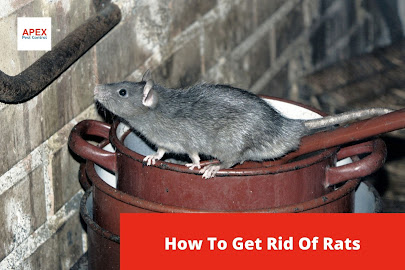Discover the most effective strategies for dealing with a rat infestation in your home, as well as how Apex Pest Control can assist with rat management.
It's no laughing matter if you have rats in your house. These rodents are disease carriers and can wreak havoc on your property.
If you suspect a rat infestation and want to know how to get rid of rats, here are seven facts to know.
1. Recognize the telltale indications of a rat infestation.
Finding rat droppings or evidence of chewing, seeing rat tracks, hearing scurrying sounds or squeaking in walls, feeling a musky odour, finding burrows, or even seeing dead rats are all common indicators of a rat issue.
2. Keep up with home maintenance and repairs.
Prevention is just as important as treatment when it comes to rodent control. Limiting their access to your property can be as simple as caulking holes in interior and external walls and flooring. A rat's body can squeeze through any space that its head can fit through. And they can construct an access point for any hole with a quarter-inch diameter or larger by nibbling on it with their formidable teeth. Keep trash can lids on and eliminate outdoor water sources to make your property less appealing to these rats.
3. Remove any possible entry points for rats.
The roof rat (also known as the black rat) and the Norway rat are two of the most frequent varieties of rats that cause issues (sometimes called the brown rat). These rats are great climbers, and they will utilize that talent to gain access to your home. To keep rats out, make sure no tree branches are contacting or spreading over your roofline, trim branches back 4 feet from utility wires, remove vines like ivy from your home's walls, and consider placing metal or thick plastic at the bottom of trees and pipes that rats might climb to gain admission. Tree guards, which are plastic or metal cones attached to a tree's trunk, will keep rodents from climbing.
4. Make it impossible for rats to tunnel under your house.
Rats may attempt to tunnel beneath your home if they are unable to climb into it. Laying a patio or row of paving stones flush with the wall of your home leading away from it is one approach to block this type of access. The more tunnelling a rat has to do, the more likely it is to give up. Another option is to dig a shallow trench along the slab's side and hammer rebar lengths into the ground. Cover the tops of the rebar with earth or concrete and space them a few inches apart. It's also a good idea to keep a large, mowed area around your house. Rats loathe having to cover big areas of open territory where they can't hide.
5. Properly store foods to prevent rodent access.
Rats will not use your space as a food source if you store your food properly, use airtight containers, and use heavy-duty rubbish receptacles. Keeping goods in rooms that are difficult for rats to get will also assist prevent them from making your house their home.
6. Understand the difference between catching and killing rats.
A rat can be caught in several methods, both lethal and nonlethal. When rats are caught in live-catch traps, however, you must find a compassionate manner to relocate or dispose of them. Traps and baits are examples of lethal tactics. Traps provide quick results, whereas baits often require numerous doses to take effect, and there is no way of knowing where a rat will be when it dies.
7. Choose the best rodent control approach for your property.
Some people believe that killing rats is simple, however, the rat exterminator method employed can help you prevent having dead rats inside your walls. Some states have restrictions on the types of traps and baits that can be used, and with either method, placement is crucial. As a result, consulting with a specialist to determine the most efficient solutions for your property is recommended.
Apex Pest Control experts can make sure the rodents in your home are aware that their lease has expired.

